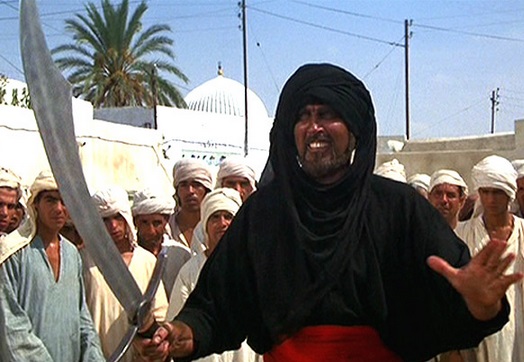  |
 |
 |
 |
|
MahdiWatch.org
|
 |
|
Home | About Me | Links to My Articles | Info on My Books | Contact Me
|
 |
|
Welcome to MahdiWatch.org! NEWSFLASH! COMMENTS LINK
BELOW EACH POST IS ENABLED! FEEL FREE TO BURY ME, PRAISE ME--OR JUST ISSUE A PERSONAL FATWA!
al-Mahdi is "the rightly-guided one" who, according to Islamic Hadiths (traditions),
will come before the end of time to make the entire world Muslim. Over the last 1400 years numerous claimants to the
mantle of the Mahdi have arisen in both Shi`i and Sunni circles. Modern belief in the coming of the Mahdi has
manifested most famously in the 1979 al-`Utaybi uprising of Sa`udi Arabia, and more recently in the ongoing
Mahdist movements (some violent) in Iraq, as well as in the frequently-expressed public prayers of former Iranian
President Ahmadinezhad bidding the Mahdi to return and, in the larger Sunni Islamic world, by claims that Usamah bin Ladin
might be the (occulted) Mahdi. Now in 2014 Mahdism is active in Syria, as the jihadist opposition group Jabhat al-Nusra
claims to be fighting to prepare the way for his coming; and in the new "Islamic State/caliphate" spanning
Syrian and Iraqi territory, as its leadership promotes the upcoming apocalyptic battle with the West at Dabiq, Syria. This site will track such Mahdi-related movements, aspirations, propaganda and beliefs in both Sunni and Shi`i
milieus, as well as other Muslim eschatological yearnings.
For a primer
on Mahdism, see my 2005 article, "What's Worse than Violent Jihadists?," at the History News Network: http://hnn.us/articles/13146.html; for more in-depth info, see the links here to my other writings, including my book on Mahdism.
|
|
|
|
Wednesday, November 26, 2014
Dabiq Issue 5: Prepare Ye the Way of the Mahdi
In the US, tomorrow, we will celebrate Thanksgiving—some as a secular holiday, but most
as a quasi-religious one commemorating the 17th century English Protestants who fled Europe for the New World in order to
establish their version of a Christian community. After reading the fifth issue of the Islamic State’s “Dabiq” magazine, I’m convinced the Thanksgiving pantheon should be extended to famous
political and military leaders who helped Christian civilization stave off Islamic conquest—such as Constantine IV, Charles Martel, Don John of Austria and Prince Eugene of Savoy. Thank God, and these men, that Islamic law never came to rule in
Europe and, by extension, America.
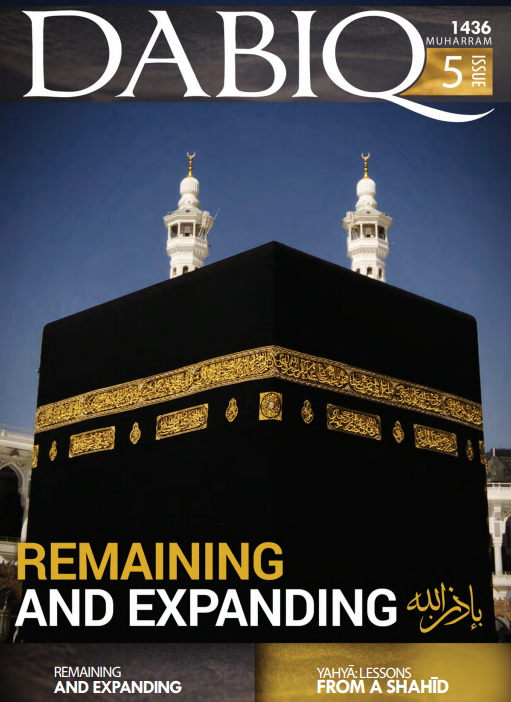
Expanding, hopefully, way down south--to Mecca-town and its Ka`bah!
Make no mistake, the Islamic State (formerly ISIS or ISIL), contra its apologists, is profoundly Muslim: the latest issue of “Dabiq” adduces
22 Qur’anic passages, 31 Hadiths (alleged sayings of Muhammad), and a legion of quotations and commentaries from other
Islamic scholars, living and dead. (See my previous analyses of “Dabiq” 1-4 on this site.)
Even allowing for Shaytan’s ability to quote “scripture,” it’s willfully ignorant to deny the ideological
basis of the ISLAMIC State.
Herein the Islamic State [IS] follows the pattern of each previous publication: explication
of a major Qur’anic figure and application thereof to modern times; reports of success (unbridled, of course!) against
its enemies on the battlefield and in the political realm; shrewd analysis of Western, particularly US, policy makers’
and media positions; and, pulling all of those together, an eschatological narrative aimed at persuading
Muslims to take the road to Dabiq, where the “coalition of the cross,” or the “Crusader armies,” will
burn in defeat.
This time,
the personality adduced is John the Baptist—called “Yahya” in the confused Qur’anic version (which conflates separate Old and New Testament data, such as identifying John’s father). The Islamic version
is that John “was sent to the rebellious children of Isra’il to guide them back to Allah”—after being
shamed by Jesus (`Isa) for his tardiness in doing so—who eventually killed, and thus martyred, him. “Dabiq:”
“the seriousness and attention given to the commands of Allah and the need to fulfill them, as well as the sense
of urgency and haste in fulfilling them is a means of strength that can push a Muslim beyond hesitation and cause him to carry
out the most difficult tasks in the path of Allah.”
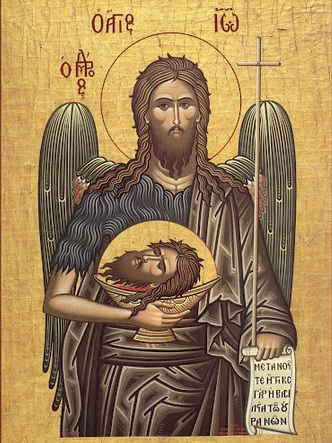
John the "Baptist/Baptizer'Forerunner" appears to be holding his own head. Ironic
that IS extolls him as a great prophet, yet executes so many just as John was killed by Herod.
Continuing, “Dabiq” trumpets (alleged) victories over Kurdish forces, mockingly
propagandizing that “the only thing the kuffar [Christian Americans] are likely to find more impressively baffling than
the incompetence of the PKK, is Obama’s decision to keep relying on the incompetence of the PKK.”
The publication also adduces its plan to start minting its own coins, and the many loyalty oaths sworn to Caliph
al-Baghdadi by groups in Arabia, Yemen, Sinai, Libya and Algeria, as proof of its not just “remaining” but “expanding”
as a state. With the help of these loyal new troops, the IS will reach Indonesia, China,
Spain and Rome.
“Crusader experts” at RAND
[sic] are shown and quoted to the effect that IS is winning. And a long section purportedly written by
British hostage John Cantlie mocks not just Western experts but “Robo-Obama” who commits “the same mistakes
over and over again,” is powerless to prevent pro-IS jihadist attacks in his own country, and who should stick to playing
golf. IS gloats over the assaults in Australia, Quebec and New York City, claiming that “all
of these attacks were the direct result of the Shaykh’s [al-Baghdadi’s] call to action….”
“Dabiq” #5 ends with a Hadith
from Abu Dawud about the Mahdi: “If there were not left except a day from the dunya [world], Allah would lengthen that
day to send forth on it a man from my family whose name matches my name [Muhammad] and whose father’s name matches my
father’s name [‘Abdullah]. He will fill the Earth with justice and fairness as it was filled with oppression and
tyranny.”
Observation:
There is little new or noteworthy in this
latest IS magazine—except for two things:
1) the ramped-up eschatological fervor demonstrated by the
Yahya/John exegesis and that final Mahdi reference. I have been asked in radio interveiws whether al-Baghdadi
or his followers consider him the Mahdi. Based on this latest magazine, I think it more likely he sees
himself as preparing the way for the Mahdi—similar to the role Yahya/John played to `Isa/Jesus; a leader who, like the Qur’anic
Yahya, follows “the legacy of the Prophets…a legacy of…the confrontation between the Prophets and the
disbelievers [which] continued to escalate until it reached either a point of physical battle, or a point of wholesale
annihilation as the punishment of Allah descended upon the disbelievers….” Caliph al-Baghdadi
probably expects that he will lead Muslim forces to a great military victory over American (Christian/”Crusader”)
forces at Dabiq—after which the Mahdi will appear and take over, making al-Baghdadi his loyal lieutenant.
Until then, the beheadings, atrocities and Islamic cleansing of all IS domains will continue apace.
2)
plastering the Ka`bah, Islam's most sacred space located in Mecca, on the cover of the magazine in tandem with the attention
lavished herein on notable opponents of the Saudis over the years is a clear means of shouting "we're coming for you,
Saudi royal family." Maybe when the IS Toyotas turn south, Robo-Obama will change his tune on inserting "Crusader"
troops into the fray.
6:27 pm est
Tuesday, November 18, 2014
The New Global Terrorism Index: Sharif Won't Like It
Two new reports on terrorism have been released in the last week: one by
the government of the United Arab Emirates; another by the Institute for Economics & Peace, called the “Global Terrorism Index.” Both are worthy of scrutiny—particularly the latter.
The UAE Council of Ministers disseminated a list of 83 terrorist
organizations. Most notably, the Council on American-Islamic Relations (CAIR), as well as the Muslim American Society (MAS),
are included as terroristic by the UAE. All 83 (not 82, as some outlets have reported) such groups identitied
by that Sunni nation’s Council of Ministers are ones that openly claim to be Islamic; whether they simply chose to deal
solely with Islamic entities, or did not deem non-Muslim terrorist organizations worthy of enumerating, is not clear from
the article. Perhaps the most striking aspect of this UAE list is that it contains almost twice as many
groups as does the US State Department one on foreign terrorism—including many I had never heard of (and I worked directly from their Arabic list).
Does this mean that that small Gulf country has better intelligence on the topic than the US? Or
that UAE’s threshold for what constitutes a terrorist group is lower (smaller number of members,
for example) than the US government’s? It’s also quite interesting that this list includes
not just the usual suspects—al-Qa`idah [AQ], ISIS (“Da`ish”), the Taliban, Boko Haram [BH]—but the
Muslim Brotherhood and various and sundry European Islamist organizations (the Union of Muslim Ulama and the various Islamic
societies in Britain, Germany and the Scandinavian countries). According to outoing US Attorney General Eric Holder’s standards, then, the UAE government must be racist and Islamophobic.
The GTI is not just a listing but an in-depth, 94-pp. analysis of terrrorism from 2000 to 2013.
Some of its major findings have already been reported: terrorist-caused deaths increased 60% in 2013 over the previous year;
four groups—Taliban, AQ, ISIS and BH—caused most of those; and “extreme interpretations
of Wahhabi Islam are the key commonality to all four groups.”
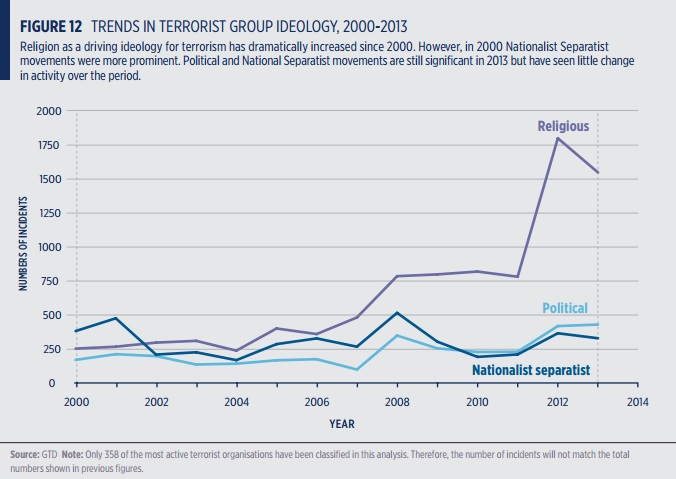
But there is much more data besides that found by journalists in the
executive summary. When this millennium began, nationalist/separatist-based violence was the planet’s
primary form of terrorism; but starting on 9/11 that was surpassed by the religious-based (Islamic, that is) kind, and the
trend has accelerated in recent years.
The rest of the top ten most deadly terrorist groups for
the period 2000-2013, after the Taliban, AQ, ISIS and BH, are: Indian Maoists, Uganda’s Lord’s
Resistance Army, the Tamil Tigers, Somalia’s al-Shabab, Colombia’s Fuerzas Armadas Revolucionarias de Colombia or FARC,
and the Chechen Islamic “rebels.” The countries most bedeviled by terrorism are, in order:
Iraq, Afghanistan, Pakistan, Nigeria, Syria, India, Somalia, Yemen, the Philippines and Thailand.
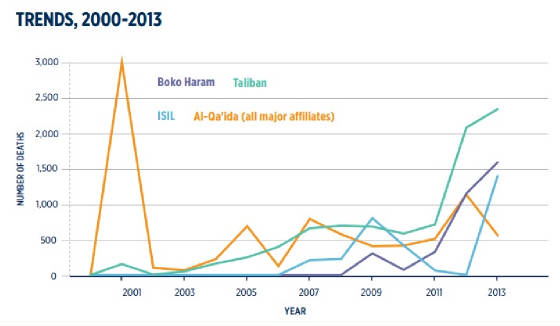
Suicide
attacks made up only 5% of the fatalities during those 14 years—but that represents some 2,500 individuals killed.
And suicide attack-by-explosive was the most lethal form of terrrorist violence, taking out, on average, 11 people—whereas
all other types of terrorist attacks (mostly firearms) averaged only two fatalities. Ninety percent of
suicide attacks occurred in MENA (Middle East & North Africa) and South Asia; no surprise there, as polling data consistently
shows substantial Muslim public support for suicide bombing. The groups most responsible for suicide attacks were: AQ, Tehrik-i-Taliban
(Pakistan), ISIS, Hamas (though none since 2008), al-Shabab and BH.
While homicide is still a far greater threat to individuals in many countries
than terrorism, the GTI study also empirically lays out the indirect toll of terrorism: “increased costs of security,
military expenditures and insurance often outweigh the original attacks. Further, [they] increase uncertainty in the market,
decrease foreign investment, alter trade and change consumption and savings behaviour” (p. 43).
One of the most trenchant points herein, made several times, is
that poverty does not cause terrorism—or as the study puts it, more academically, “there
is no systematic link to poverty measures….Similarly, economic measures such as GDP growth also do not correlate “
(p. 59). The closest correlations with terrorism are lack of political stability; intergroup cohesion and
“group grievances;” and the (il)legitimacy of the state.
Between 1968 and 2006 (drawing on a RAND study), the most
likely way for a terrorist movement to come to an end was by incorporation into the political process (43% did so in
such fashion); second was via “policing” (40%); 10% of terrorist organizations actually triumphed; and only 7%
were defeated solely by military force. GTI, however, does not really explain the differences between
“policing” and “military force.” And the period examined in this section was one
in which many 1960s nationalist and Leftist/Anarchist groups met their demise—whereas the vast majority of the groups
since 2000 are religious (Islamic, to be honest) and the authors admit that “groups with an international focus and
a religious orientation…are more likely to continue operating, increase in size, and need military intervention to
stop them” (p. 56).
Observations:
1) Poverty does not cause terrorism. Someone
please alert “The Economist” and BBC, much of the US media, and most of the modern Democrat
party.
2) GTI makes one major mistake: the Taliban are motivated by Deobandi Islam, not the Wahhabi
brand; South Asian Deobandism developed entirely separately from Arabian Wahhabism, although they resemble one another now insofar as both are manifestations
of literalist, fundamentalist Sunni Islam.
3) There is only one Christian terrorist group on GTI’s list: the Lord’s
Resistance Army of Uganda. Accepting arguendo that LRA is Christian—so as to maintain intellectual
consistency with labeling groups that claim to be representing Islam as such—there are still major differences between
it and Islamic terrorist ones: practically every Christian in the world condemns it (which is not the case
with Muslims and Islamic terrorism); and the LRA stands alone in this study as “Christianist” terrorism (unlike
the dozens—or 83—Islamist terror entities).
4) The world’s foremost terrorism stage
is Iraq, which saw over 6,000 deaths from such in 2013. And as much as it pains me to say it, the United
States is the major reason for the unleashing of the Islamic terrorist “genie” (jinn) in that country.
There were plenty of problems under Saddam Husayn’s brutal reign—but widespread terrorist fatalities were
not one of them. Afghanistan, with over 3,000 fatalities, is second. At least with that
country the US had a good reason to invade: to take out the staging area, and enablers of, the 9/11 attacks. But
in both Iraq and Afghanistant the proximate cause for rampant terrorism is American destruction of previously-existing political
systems—although, of course, the ultimate reason for Islamic terrorism in both countries is, well, Islam itself.
5)
Oh, and did I mention that, once again, we have empirical data that poverty does not cause terrorism?
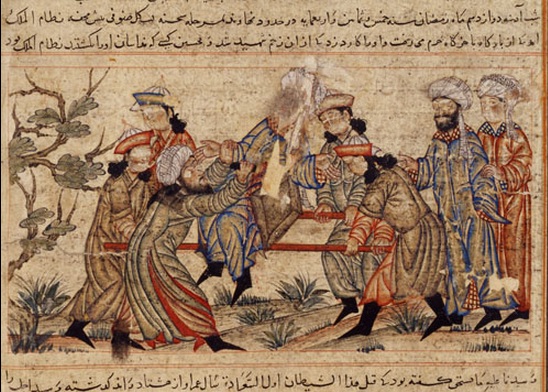
Medieval Muslim terrorists--the Isma'ili Shi`i "Assassins"--whacking the Seljuq Turkish
ruler Nizam al-Mulk in 1092 AD. (No, the Isma'ilis were not poor!)
4:44 pm est
Saturday, November 15, 2014
Lecturing (on ISIS) Like It's the End of the World
My 10.23.14 lecture at Concordia Seminary (St. Louis), on how Islamic eschatology is motivating ISIS and some other
Muslim terrorist groups, has been covered by the Lutheran Church-Missouri Synod's "Reporter:" "ISIS, other radical Islamists driven by Muslim eschatology."
Alas, even journalists in my own conservative denomination (both theologically and, generally, politically)
have been infected by political correctness; I made a point of saying that ISIS and its ilk are, in fact, not "radical"
but literalist when it comes to Qur'an and hadiths. So just read the article!
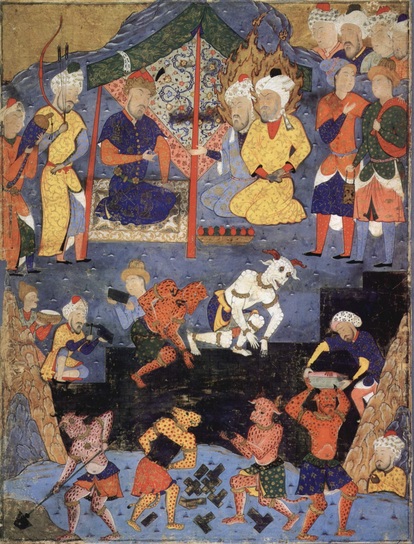
ISIS Mujahidin hard at work building the caliphate! No, wait--this is actually 16th c. Persian
artwork depicting Alexander the Great ordering jinn to build a wall to enclose the murderous hordes of Yajuj and Majuj (Gog
and Magog), who will stay penned up until the End Times' battles.
Tuesday, November 11, 2014
Is the US Misunderestimating Iran--for Legal Reasons?
In all the excitement over the Islamic State (of Iraq and al-Sham), some political leaders (Israel's Prime Minister and an Australian member of Parliament, most notably) claim that the world has lost track of a much greater threat: the Islamic Republic of Iran.
Of course, Western, and particularly American, negotiations with Iran over its nuclear program have been a political minefield for at least two US administrations--complicated, now, by the recent revelations that President Obama has written to Supreme Leader Khamenei, seeking closer cooperation against ISIS.
American policy makers seem habitually to misunderstand the Islamic
Republic's leadership, ideology and goals. Admittedly, I've formally studied Iranian history and the Persian language, visited the
country (albeit for only 10 days, in 2008) and written extensively in recent years on Iran's domestic and foreign policies--yet
even I often see that government as a riddle wrapped in a mystery and buried in a bowl of gheimeh.
So, on the one hand: acknowledging the complexity of the Persian problem does not absolve
those well-paid, Inside-the-Beltway professionals of responsibility; but on the other: might there be a structural issue at
work here? I began thinking about this after reading the special section on Iran, "The Revolution is Over," in the November 1st issue of "The Economist." In particular, note this bit of data: "Iran's
cabinet has more members with PhDs from American universities than that of America itself...." (p. 6).
I did a bit of research into comparative educational levels of the two countries' leaders. Among the 21 members of
Iran's cabinet, there are 11 PhDs, one MD, and one ABD in Mathematics. And no, the doctorates are not all in Islamic law/jurisprudence;
in fact, only two are. President Rouhani holds a PhD (Edinburgh) in Constitutional Law; the other non-Islamic studies
specializations are in areas such as Industrial Engineering, Economics, Management, International Relations, Geography
and Political Economy. Furthermore, many of these degrees are from outside Iran--institutions such as University of
Warsaw, London School of Economics and the University of Denver.
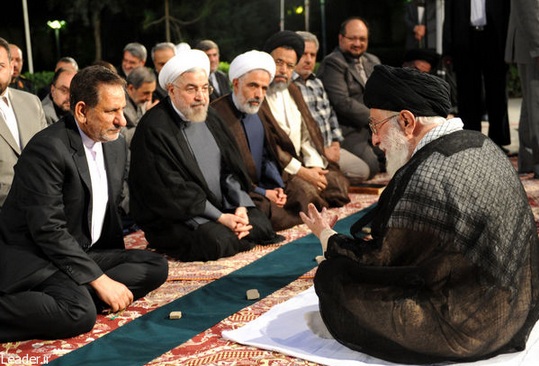
Supremo Khameini meets with President Rouhani and the cabinet. Rumor has it the chap
in the flannel shirt (2nd from right) was sent to meet the houris afterwards.
Now let us
examine the current US cabinet. Of its 19 members (including the DNI and DCI, although they are not formally deemed
such), there are two DPhils: one in International Relations (Trade Representative) and one in Economics (the Economic Advisor).
As should be no surprise to anyone, there are 11 JDs in the Obama cabinet. The rest are comprised of: one Mechanical
Engineer (Interior) and one MBA (the VA); two Master's degrees (the DNI and the DCI); and two individuals who have only Bachelors'
degrees (Defense and HHS).
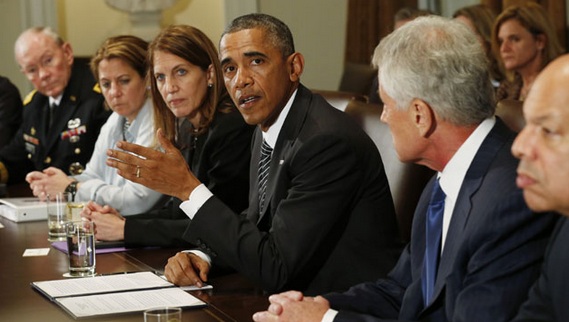
President Obama meets with his cabinet. Not pictured: VP Biden sitting on floor.
And just for even more comparative analytical fun, let's look at the degrees held by some prominent Sunni Islamist/terrorist
leaders. al-Qa`idah's chief Ayman al-Zawahiri is a MD with an MS in surgery, to boot; the Muslim Brotherhood "spiritual
guide," Muhammad Badi`, hold a DVM; the global head of the caliphate-restoring Hizb al-Tahrir, Ata Abu Rashta, is a civil
engineer. Only the ISIS "caliph," Abu Bakr al-Baghdadi--who, despite rumors, is not dead yet--and the leader of Boko Haram, Abubakr Shekau, are said to have advanced degrees in Islamic law/jurisprudence.
Observations:
1) The Islamic Republic of Iran is run by very educated, and likely very intelligent,
men with quite diverse intellectual horizons. At the same time all of them, doubtless, are also very pious Twelver Shi`i
Muslims. This runs counter to the secular/atheist slander that strong religious belief (particularly Islamic or Christian) equates to stupidity and low intelligence. Beard length
is not inversely proportional to intelligence--whether the person in question is from Louisiana or Luristan.
2) Lawyers are intelligent; some of my best friends--including my wife--are attorneys. But
the legal worldview is not exactly a broad one, and too often leads to an obsession with process over substance.
(And to be fair: the Obama Administration is not the only one in recent decades top-heavy with JDs.) Perhaps this narrow legal
focus helps explain why the current US leadership cannot
see the Islamic Republic for what its leaders truly believe
it to be: the vanguard of the globe's mostazafan, "oppressed," in their struggle against the exploitative
(Western Christian) world order created in the last 500 years by the the arrogant mostakhbaran, "exploiters." Twelver
Shi`ism alone does not explain modern Iranian political thought, because even ayatollahs have been inculcated with heavy doses
of neo-Marxist ideology (which actually meshes well with the socioeconomic "deliverance" aspect of Twelver Islam).
But American law schools--even elite Ivy League ones--don't teach such topics.
3) Looking at the Sunni Islamist/terrorist
leaders vis-a-vis those of Iran, one might well speculate that the likelihood of brutal rule increases when the
individual has an advanced degree (or at least study) in Sunni Islamic literalism. al-Baghdadi and Shekau have certainly
made ISIS and Boko Haram, respectively, bastions of Islamic barbarity. Conversely: al-Zawahiri tries to kill
Americans but does not impose hand-chopping shari`ah on his co-religionists; Badi` heads a decidedly Islamist but
actually non-terrorist organization; and Rashta's group aims for peaceful restoration of the (Ottoman-style) caliphate.
So it appears that an insular Islamic higher education--particularly an Arab or African Sunni one--is more problematic
than its Iranian, Twelver Shi`i counterpart. (For those of you who think I'm being too hard on the Arabs: yearly Iran
"publishes three times more books than all Arab nations combined"--same "Economist" article, p. 6.)
4) "The Economist" piece also states that "the winner of last year's election, Mr. Rohani, is pursuing
a moderate agenda. His government is staffed by pragmatic technocrats rather than messianic nationalists" (p. 6).
I think that actually Iran's current cabinet should better be described as "messianic technocrats"--since each is
(as aforementioned) certainly a true believer in the IRI's Mahdist mission while, simultaneously, almost every one is decidely
cosmopolitan and, again, highly educated. As I've stated and written before, this means inter alia that the government in Tehran has no intention of nuking Israel (or anyone
else) in order to hotwire the apocalypse--and thus that ISIS presents the true clear and present danger to the Middle East
rather than the Islamic Republic of Iran.
5) In no wise am I equating PhDs with brilliance, integrity or even necessarily
clarity of thought. Suffering through a PhD program myself made clear that all it takes to get one is a reasonable amount
of intelligence and dogged--even mule-headed--determination. And in point of fact some of the biggest fools on planet
Earth have doctoral degrees. What I am saying here is that the amount of research needed for such a degree
is considerably above that demanded of a JD or Master's--and, thus, that the collective worldview of the ruling circle of
Iran is perhaps a better informed one about many issues than is that of my own country.
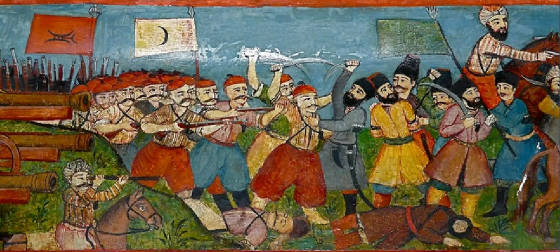
The good old days: when Sunnis were Ottomans with killer moustaches, Iranians were Safavids
with "Duck Dynasty" beards (rather like today, come to think of it)--and everyone had scimitars!
|
|
|
|
| Jamkaran Mosque near Qom, Iran (during my trip there Aug. 2008) |
|
|
|
